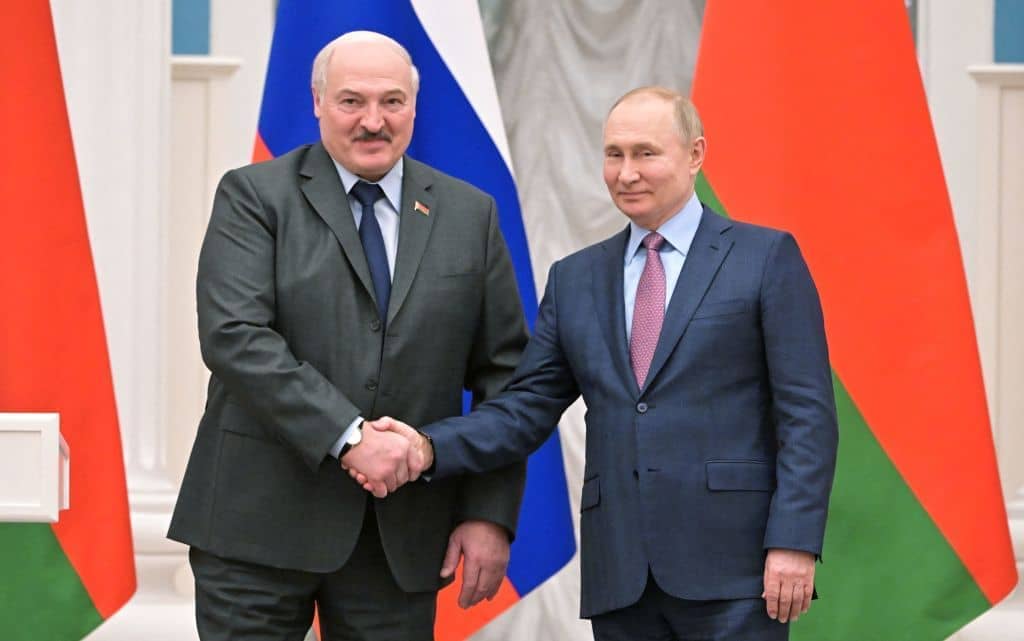Next week Putin is due to meet Alyaksandr Lukashenka, self-proclaimed president of Belarus, for the sixth time since the invasion of Ukraine. This will also be the first time in three years that they have met in Belarus.
Much hooha is usually made by the Russian and Belarusian press of their meetings. There is always a ‘happy families’-style photoshoot: Lukashenka towering over Putin, grasping his hand in his meaty fist, looking like Laurel and Hardy’s grotesque reincarnation. According to official readouts, their long meetings tend to cover a variety of mundane topics: agricultural output, the state of their economies, general commitments of mutual support.
These meetings are, in themselves, nothing special – they have been a facet of Putin and Lukashenka’s relationship for many years. But this meeting will be significant for several reasons.
Since Russia invaded Ukraine, speculation has been rife as to whether Belarus would join the war. Lukashenka has supported Putin, allowing him to transport troops and weaponry through the country and even permitting the Russian forces to launch long-range missiles at Kiev from Belarusian territory. He has frequently made speeches parroting the Kremlin’s disinformation and calling Russia’s victory in the ‘special operation’ inevitable. All of this has landed Belarus with nearly equivalent sanctions to Russia.
Thus far, it seems Lukashenka’s desire for self-preservation has prevented him from fully throwing in his lot with Russia.
And yet, so far, Lukashenka has remained on the fence over officially joining the Kremlin’s war effort. This isn’t entirely surprising: Lukashenka has long been known to play off his geographical advantage, wedged between Europe and Russia, to gain concessions from both.
But Belarus’ contested election in 2020, in which Lukashenka claimed a highly dubious victory over Svetlana Tikhanovskaya, changed things. The election triggered wide-spread protests and a hugely repressive state crackdown on freedom of speech. This culminated last year with the arrest of exiled journalist Roman Protasevich, who was detained after the Ryainair flight he was on was hijacked in Belarusian airspace. The West reacted with horror, slapping sanctions on the country and ostracising Lukashenka and his cronies.
That Lukashenka has kept a grasp on power for nearly two years following that election has been, in main part, down to Putin’s support. And they both know it. The moment Putin decided to invade Ukraine was also the moment at which he began to cash in his chips with Lukashenka.
After next week’s meeting, the two presidents will have met as many times in the first six months of this year as in the whole of 2021. Many commentators speculate that, behind closed doors, Putin will once again attempt to persuade Lukashenka to enter the war.
So how likely is he to agree?
Putin’s visit to Belarus coincides with military exercises the Belarusian army plans to conduct in the Gomel region along the Ukrainian border. According to the Belarusian Ministry of Defence, to make the exercises as ‘close to reality as possible’ members of the army’s special operations forces will also take part.
While this may be a coincidence, experience of observing how Russia and its allies operate would warn against taking it at face value. After all, it was under the pretence of military exercises that Russia prepared for and invaded Ukraine back in February.
On the other hand, there are indications that Lukashenka has decided to sit tight on the fence for at least a little while longer. His rhetoric on the war has changed somewhat of late: at a speech in Bobruysk last week he said: ‘How this war will end – nobody knows. It’s impossible to give predictions.’
Lukashenka stands to lose a lot from joining the war in Ukraine, arguably more so than Putin. He is well aware that his power in Belarus hangs on by a whisker, largely propped up by the army and security services. Although official polling in Belarus is challenging, the indications are that, on the whole, Belarusians are overwhelmingly opposed to a war with Ukraine. In a country that still has conscription, sending recruits to fight an already unpopular war would be a hugely risky move.
Thus far, it seems Lukashenka’s desire for self-preservation has prevented him from fully throwing in his lot with Russia. He may well be hoping he can wait the whole thing out. Of course Putin will be hoping otherwise – their meeting next week may change things still.
But for everyone’s sake, let’s hope this horror show Hardy continues to sit on his fence for a little while yet.







Comments